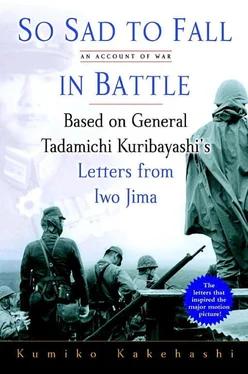February 21 was only three days into the battle, but the central military command had no intention of expending any more planes for the sake of Iwo Jima. This was something that Kuribayashi and his staff had known all along.
AS THE FLAMES OVERRAN Tokyo on March 10, the outcome of the battle on Iwo Jima had already been decided.
Kuribayashi was starting to get reports of entire units choosing to die in suicide attacks. Although he had sternly forbidden banzai charges, the soldiers were growing physically weak as their supplies of food and water ran out. They were also surrounded by the Americans and were sure to die whether they moved forward or stayed put. Under these circumstances, it was hardly suprising that some officers decided that yelling banzai and charging to an honorable death was the better option.
Every time he received a radio message announcing a unit’s intention to make a final, fatal charge, Kuribayashi would issue a stern order for them to call it off. Some units did abandon the idea, but others went through with it. The units that followed Kuribayashi’s orders and canceled their plans for suicide charges left their bunkers and tried to join the forces at the Command Center. Many of them were killed by enemy fire on their way there.
The Japanese soldiers were being tormented by thirst in underground bunkers, where every day there were more corpses of their comrades. Meanwhile, just a few kilometers back from the front, the American soldiers were able to drink hot coffee and take showers. As the Japanese soldiers breathed their last with worn and creased letters from home in their breast pockets, the Americans were getting deliveries of letters from their families that had been flown over from the United States.
The Americans now regarded the Iwo Jima operation as more or less complete, and an official flag-raising ceremony was conducted on March 14. The flagstaff for this was located some 200 meters north of Mount Suribachi. As the flag was raised there, the one on top of Mount Suribachi was lowered.
A declaration of occupation by Admiral Nimitz was read at the ceremony. The man himself had already left the island for a meeting in Guam to prepare for the next campaign: the capture of Okinawa.
Lieutenant General Smith was, of course, present, near “his” marines. His eyes were full of tears as he said to Major General Graves B. Erskine, commander of the Third Division, “This is the worst yet.”
But the “worst” was, in fact, far from over.
Not that far from where Lieutenant General Smith was standing, a cemetery had been built for the soldiers who had been killed on the island. Despite Nimitz’s proclamation, the number of white-painted crosses there kept on growing. The Japanese soldiers did not abandon their resistance, and the fighting at the front lines was as desperate as ever. Between this day and the collapse of organized Japanese resistance that followed the death of Kuribayashi, the commander in chief, the Americans were to suffer more than two thousand more casualties.
The lines of the Japanese and American troops were now separated by as little as 50 meters. The Japanese had run out of shells and bullets and had to depend on hand grenades. They always kept an extra one for their own suicide.
By March 14, the Japanese had nine hundred men (of whom two hundred were navy personnel) left in their last stronghold in the northern end of the island. These were not the only Japanese troops left on the island. Men were still alive in bunkers in areas that the Americans had passed across, and many of them fought guerrilla style even though their units were scattered and there was no one left to lead them. Although the Americans urged them to surrender, no one complied. In parts of the island that the Americans thought they had long ago subdued, Japanese soldiers would suddenly burst out and inflict casualties on them.
The Americans started to make use of Motoyama Airfield on March 15. On March 16, Admiral Nimitz announced the end of the Iwo Jima campaign and issued a special communiqué declaring the island officially occupied. In the communiqué, Nimitz praised and thanked the marines for their unparalleled courage and self-sacrifice.
The Japanese troops were certainly not alone in fighting bravely on Iwo Jima. Looking at it impartially, one has to acknowledge that the marines’ extraordinary exploits deserve to live on in history.
There were officers who continued to lead their men up until their last breath, standing in a sea of their own blood; there were men who died flinging themselves bodily onto a grenade to save their comrades. The marines may have enjoyed a significant advantage over the Japanese in terms of matériel, but the courage they showed in the face of the worst casualties since the founding of the Marine Corps was worthy of the respect and gratitude of the American people.
Nimitz’s communiqué concluded with the words: “Among the Americans who served on Iwo island, uncommon valor was a common virtue.”
This phrase, which extolled the capture of Iwo Jima not from the perspective of military strategy but from the perspective of individual courage and devotion to country, won the hearts of the American people. The phrase achieved overnight fame and is inscribed on the victory monument on the top of Mount Suribachi, as well as being engraved on the base of the statue of the six soldiers raising the Stars and Stripes on Suribachi in Arlington National Cemetery.
THAT SAME MARCH 16, Kuribayashi’s resolve to come out and make a final all-out attack was slowly hardening.
Until this point, Kuribayashi had not allowed any units to make suicide charges, but by now the Japanese forces were completely encircled by the Americans and bottled up in a very tight space measuring around 700 meters north to south, and between 200 and 500 meters east to west. The Americans were putting pressure on the bunkers with gun- and tank fire, and Japanese casualties continued to mount. Taking this—as well as the remaining quantities of explosives, food, and water; the number of wounded; and the soldiers’ physical powers of endurance—into account, Kuribayashi judged that now was the time when an all-out attack could be effective.
It was at some point after 4:00 p.m. on this day that Kuribayashi dispatched his farewell telegram to the Imperial General Headquarters.
The battle is entering its final chapter. Since the enemy’s landing, the gallant fighting of the men under my command has been such that even the gods would weep. In particular, I humbly rejoice in the fact that they have continued to fight bravely though utterly empty-handed and ill-equipped against a land, sea, and air attack of a material superiority such as surpasses the imagination.
One after another they are falling to the ceaseless and ferocious attacks of the enemy. For this reason, the situation has arisen whereby I must disappoint your expectations and yield this important place to the hands of the enemy. With humility and sincerity, I offer my repeated apologies.
Our ammunition is gone and our water dried up. Now is the time for us all to make our final counterattack and fight gallantly, conscious of the Emperor’s favor, not begrudging our efforts though they turn our bones to powder and pulverize our bodies.
I believe that until this island is recaptured, the Emperor’s domain will be eternally insecure. I therefore swear that even when I have become a ghost I shall look forward to turning the defeat of the Imperial Army into victory.
I stand now at the beginning of the end. At the same time as revealing my inmost feelings, I pray earnestly for the unfailing victory and the security of the Empire. Farewell for all eternity.
As regards Chichi Jima and Haha Jima, I am sure that the men under my command there can completely crush any attack the enemy might make. I entrust that matter to you.
Читать дальше












